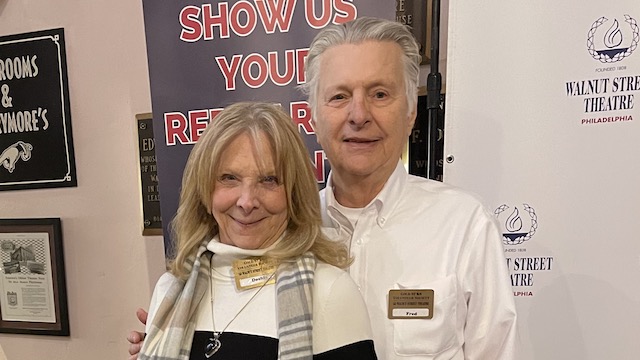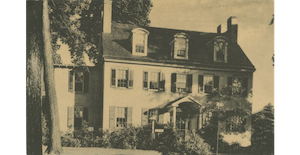
After hearing about Fred Melroy and his prolific work in the Quaker community for some time, at long last, I had the chance to meet with him for a conversation. Wanting not only to understand his role as Clerk for the Greenleaf Granting Group, but also what makes him tick, I asked him several questions about his faith. But the more I pushed, the more he talked about his work, until at last it became clear to me that for Fred, serving is at the very center of his beliefs. That is not to say he is some kind of uninspiring automaton—quite the opposite. When Fred speaks about his work, he welcomes you in with his no-nonsense humility and leaves you feeling that so long as there are people who love to serve and who love the people they serve as much as he does, there is a bright future ahead.
Q: First, tell me a little about the Greenleaf Granting Group history. How did everything get started?
My wife Doshia was the clerk of the Greenleaf Boarding Home for some time, and the boarding home’s story is also the story of how the granting group came into existence. The home was founded about a hundred years ago, 1893 I believe, in Moorestown N.J.— a really beautiful building that was built on land given to the Greenleaf by Alice Paul’s parents. A lot of people know that Alice Paul is a great woman in the story of voting rights for women, famous not only in Quaker circles but beyond as well.

What happens next is that the boarding home was sold in 2008; my wife, Doshia, worked to sell the home to Moorestown Friends School. The home’s endowment, coupled with the proceeds from the sale, left Greenleaf with a very sizable fund that was then invested and grew considerably. Doshia is one of the people who created the Greenleaf Fund that the group manages. She was the last Clerk of the Greenleaf and part of the founding group of Greenleaf Granting.
Q: Bringing it all up to the present day. What does the group look like now?
The group currently has a yearly pool of $350,000 that we give away to aging Quakers, age sixty-two or older. Most of them aren’t working much anymore so they naturally have less funds. Some are in retirement homes and need just a little bit more money to meet their needs. We currently have forty-seven people we are giving grants to, and we find more people to give assistance to every time the group meets. Some need help for more one-off things. Maybe they need to go to the dentist, and they don’t have any dental insurance. Something like that can be a $4000-$5000 expense. Other times, we buy wheelchairs for people, or help people who’ve come into financial trouble to pay off tax bills.
With each case, we evaluate everything very carefully. We ask for three months of bank statements, a copy of their tax returns, and other documents. We want to make sure the funds go to the people who need it most.
We look first for people to help within Haddonfield Quarter, and when we’ve met the needs there, we look to the rest of the yearly meeting, and even Friends outside the yearly meeting as well.
Nobody likes to ask for money. It’s soul-baring. It’s just hard to say, listen, things are not working out for me, can you help? It’s a big ask for most people to say that kind of thing.
Q: As the clerk for the group, what does your role look like? What is your favorite part of the work?
It’s my job to set the agenda for the group.Quakers like to come to a consensus in everything we do, so everyone in the group puts in a lot of combined effort. I read everything that gets sent to us, that’s just my personality, so the other members often rely on me to interpret things and to keep things on track along with valuable support from PYM Staff. Other members of the group have various backgrounds that complement our deliberations. When we meet every quarter, it’s important that we’re well prepared. I think one of the reasons I like to be so thorough is that the work we do affects people’s lives. It should be done right.
Q: You’ve been working with the group for three years now. How did you get involved with the group? What’s your own Greenleaf Granting Group story?
Since we are in the same Quarterly Meeting as the group, I felt like I wanted to continue the legacy. When I became available, I felt led to do this work. I retired seven years ago from NYU Medical Center in New York City. So, part of it is that I’m trying to keep myself active. I was Senior Director of Contracting with NYU. My background is in accounting, but I’ve been in the Army, and worked for the Wall Street Journal among other things. But working for a not-for-profit like NYU was a big change for me. It led to me looking at the world differently and in a way, that contributed quite a bit to becoming a Quaker, and in turn, it also led me to the work I am now doing for the group.
Q: You’ve been fortunate to lead a varied and rich career. How has your professional journey fed into your life journey?
I definitely feel like I was led to contribute time and energy to The Religious Society of Friends. Returning from my Army Service in Vietnam I felt I wanted to help others in the best way I could. My first contact with Friends was when I left the Wall Street Journal and moved to United Hospitals of Newark. The CEO was a Quaker and he reached out to hire veterans like myself. Later when looking for a school for our daughter to attend we found Moorestown Friends School and we had found the religion that we would spend the rest of our lives in.
I was raised Presbyterian and my wife is Jewish, so we were always looking for something that would be compatible with both of us. In the early 80s, we were young parents and also wanted to find a place that could help us educate our young child. Somehow, it just worked out for us and we found The Religious Society of Friends.
Q: You clearly see value in a life that is filled with service. And you’ve shared with me that being the clerk for the Greenleaf Granting Group isn’t your only volunteer role. What else are you working on?
Keeping busy is something I’ve just always done. My wife does it too. My daughter is on the board of two Quaker organizations, so it must be a family thing. Even before I retired, I volunteered on the board of the local YMCA and helped with Quaker work as well. Quakers believe in service, so when I decide to serve, I strive to do it well. It’s important that I do the best job I can. The other day, my daughter told me I say “yes” too often. Maybe she’s right.
I feel like service is something you need to do as a human being. We only come this way once, and you can either be selfish or giving — or in-between, I guess. Everyone can serve in their own way. I have a buddy of mine who cuts grass for old people for free. I have another buddy, Robert Goff, my old boss from NYU, who has a not-for-profit, RIP Medical Debt, where he negotiates people’s medical bills down and then pays them off. He raises millions to help people in need. It’s amazing to see how he’s really turned it into something.
I’m also treasurer for Friends Journal which also has the QuakerSpeak series, a great resource that teaches about Quakerism. And I’m on the Finance Committee.
Q: As someone who works so hard to get needed funds to people, it’s clear that is central to your faith-life. Do you feel a similar drive to share your Quaker faith with others through outreach?
Oh yes, I do feel that way. I think the Friends Journal is a great outlet for outreach, and QuakerSpeak especially. I also think our colleges are great tools in getting the message out there.
Q: For Friends who are reading this and thinking — this Fred guy clearly knows how to contribute but what can I do and how can I help — what would you say to them?
We’d definitely like to get more people involved. It’s easy to become complacent and just watch TV all day or scroll on social media. I don’t really know the secret to how to make a difference, but if we can lead by example, that’s what we should try to do. If people strive to be the best they can be, then they can lead by example wherever they are.
Learn more about the Greenleaf Granting Group. On the Quaker Aging Resources website, you’ll find a article on Celebrating Lives and Life Stories. This article was the impetus for initiating interviews with members of PYM.
This article was prepared by Paul Jepsen, previously Interim Communications Director in collaboration with Sheila Sorkin, Aging Support Coordinator to provide support to those in the aging community of the Philadelphia Yearly Meeting as part of the “To Brighten Your Day” series.
Photos: courtesy of Doshia and Fred Melroy